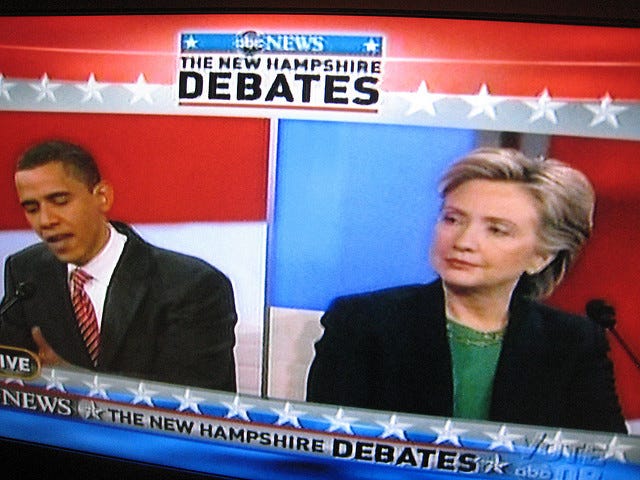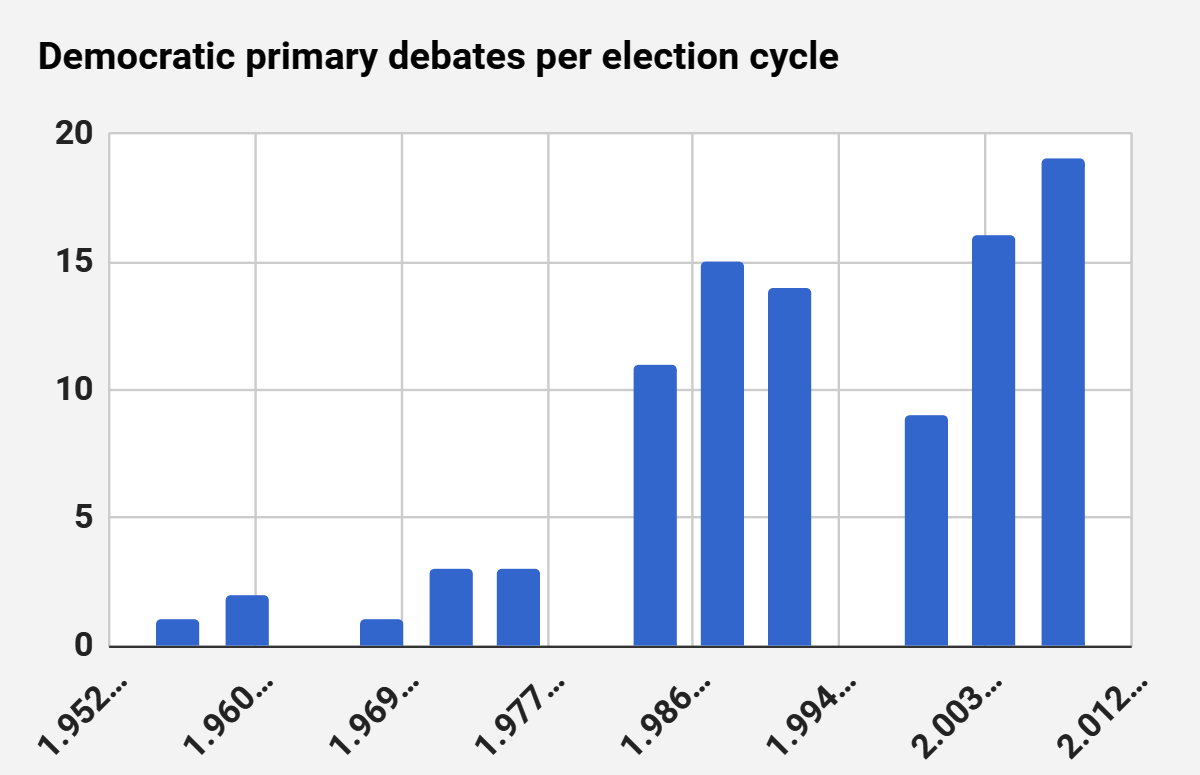
The most memorable moment in a presidential primary debate took place in a hot and stuffy Nashua gymnasium when an angry Ronald Reagan upbraided the moderator who was attempting to have his microphone turned off and famously declared, “I am paying for this microphone, Mr. Green!”
Three days later, Reagan defeated George H. W. Bush in the 1980 New Hampshire primary by an unexpectedly large margin and the rest is history. “I may have won the debate, the primary — and the nomination — right there,” Reagan later wrote.
A change in the rules
That was just one of the 35 presidential primary debates that have been held in New Hampshire over the years, more than any other state. The debates have become as much a part of the first-in-the-nation primary traditions as the revered one-on-one contact.
In 2008, the last election cycle with a contested Democratic primary, the party held three presidential primary debates in the Granite State. Voters were introduced to candidates in early June, 2007 during a debate held at Saint Anselm College. In the fall, Dartmouth College hosted a debate that was moderated by the late Tim Russert. And then, three days before voters headed to the polls, a debate at St. Anselm College drew over nine million television viewers, the largest debate audience of the primary season.
That last debate produced another signature moment. Many believe a backhanded compliment from then-candidate Barack Obama – “You’re likable enough, Hillary” – produced a backlash that helped propel Clinton to an upset win in the primary and set the stage for the protracted nomination battle that followed.
This year, the Democratic National Committee (DNC) has changed the rules. Candidates and sponsors are now prohibited from participating in any debate other than the six DNC-sanctioned events. It is the fewest number of Democratic primary debates since 1976, according to data compiled by the University of Virginia Center for Politics.
To add insult to injury in the eyes of many Granite State Democrats, the only debate to be held in New Hampshire is scheduled for the Saturday night between Hanukkah and Christmas. This is more than seven weeks before the likely primary date and a night when many voters will be preoccupied with holiday chores and family gatherings.
Granite State Democrats push back
In a release, DNC chair Debbie Wasserman Schultz argued the six debates provide “a reasonable number of impactful debates … while remaining manageable for all of the candidates.”
Granite State Democrats disagreed and pushed back. In August, several Democratic lawmakers and activists published op-eds calling for more debates.
“Presidential campaigns in the 21st century are sometimes endlessly scripted affairs,” Democratic activists Mary Rauh and Jay Surdukowski wrote in the Union Leader. “A debate is a chance for a candidate to face the unscripted; to meet the difficult. The presidency is the most unscripted job in the world and debates are the one true moment where we in New Hampshire may compare and contrast our choices on a single screen.”
Peter Burling, a former state senator and Dudley Dudley, a former executive councilor, criticized the “authoritarian attitude” of the national party. “By adopting a debate schedule and rulebook that is essentially designed to control the behavior of the candidates rather than showcase their personal strengths and political ideas,” they wrote in the Concord Monitor, “the Democratic hierarchy has allowed attention to stay focused on the ‘ideas’ of men like Trump and his sycophants.”
State Sen. Martha Fuller Clark (D-Portsmouth), vice chairwoman of the state party and a member of the DNC, personally confronted Wasserman Schultz in what she described as “a rather intense discussion.”
“I’m very disappointed that the chair of the DNC has been unwilling to reconsider this schedule, which she determined on her own, with her staff,” Fuller Clark told the Boston Globe. “She did not run it by the executive committee of the DNC, she did not run it by the members of the DNC. People have been telling her that they are unhappy with this schedule, and she has been adamant about not making any changes.”
The protests reached a boiling point last month when the party faithful who had gathered in Manchester for the annual state convention heckled the DNC chair and interrupted her speech twice. “Come on folks. We are all on the same side.” Wasserman Schultz pleaded with the audience. “So let’s make sure we focus on the Republicans. We should not be arguing amongst ourselves.”
New Hampshire Debates
Despite the outcry, Wasserman Schultz has held firm against expanding the debate schedule. “We’re going to have six debates. Period. We’re not changing the process. We’re having six debates,” she said at a breakfast hosted by the Christian Science Monitor.
Granite State Democrats have not given up. A group of over 80 Granite Staters (including yours truly) have formed a coalition, New Hampshire Debates, with the goal of securing at least one additional Democratic debate before the New Hampshire primary.
Members of the coalition represent current and former elected officials, town and county Democratic Party leaders and activists and include supporters from various presidential campaigns. They will be meeting with media, non-profit organizations and educational and civic institutions to identify sponsors for one additional debate before the New Hampshire primary.
“Our allegiance to any one campaign is exceeded by our desire and passion to keep New Hampshire and the nation blue in 2016,” Burling said. “This coalition will work together to preserve one of the long traditions of the New Hampshire primary and strengthen our eventual Democratic presidential nominee.”



